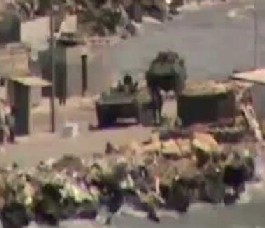Syria tanks enter Homs while fighting Palestinians in Latakia
Encouraged by the 15-day leeway granted him by the US President Barak Obama and Turkish Prime Minister Tayyip Erdogan, Bashar Assad Monday, Aug. 15, sent his tanks backed by mechanized infantry into Homs, a town of 1.5 million inhabitants. Witnesses report heavy shelling and clouds of smoke. Homs is Syria's third largest town and the biggest the Syrian military has assaulted in the course of the five-month uprising against the Assad regime.
While Obama and Edrogan presented the extra time they granted Assad as his last chance to implement reforms, the Syrian ruler is making use of it to crack down harder and grind the opposition to dust. After that, the Assads will reign supreme and there will be no one left to fight for reforms.
Sunday, Aug. 14, debkafile reported on Palestinian armed resistance to Syrian tank incursions in the coastal town of Latakia.
For the first time in the five-month anti-Assad uprising, Syrian forces clashed with dissident Palestinians Sunday, Aug. 14, in the al-Raml a-Filistini district of Syria's biggest port Latakia. As they moved toward the town center, the two Syrian tank divisions and armored infantry were challenged by Palestinians firing heavy machine guns, anti-tank RPGs and roadside bombs. Nineteen of the 24 dead Sunday were Palestinians.
debkafile's military sources affirm that contrary to earlier reports, the Syrian missile ships cruising offshore took no part in the attack on Latakia. Their function is to blockade the port against arms smuggling. Nevertheless the weapons used by Palestinians fighting in Latakia Sunday came from Lebanon aboard smugglers' boats. There are almost daily incidents of Syrian ships firing on suspect vessels.
NATO headquarters in Brussels and the Turkish high command are meanwhile drawing up plans for their first military step in Syria, which is to arm the rebels with weapons for combating the tanks and helicopters spearheading the Assad regime's crackdown on dissent. Instead of repeating the Libyan model of air strikes, NATO strategists are thinking more in terms of pouring large quantities of anti-tank and anti-air rockets, mortars and heavy machine guns into the protest centers for beating back the government armored forces.
Since the Syrian air force would certainly shoot down air transports making the drops, the tendency is to get the weapons to their destination overland, namely through Turkey and under Turkish army protection by either of two routes: The Turkish plan drafted some months ago for establishing buffer zones inside the Syrian border, is one. The refugees from the battle zone would be given sanctuary there instead of crossing into Turkey and the protected enclaves would also serve as weapons distribution depots.
Alternatively, the arms would be trucked into Syria under Turkish military guard and transferred to rebel leaders at pre-arranged rendezvous.
NATO and Turkish military sources have declined to indicate when, how and by what means, the Syrian rebels, civilians with no experience in firearms, will receive the weapons.
debkafile's military sources disclose that for the past two weeks, at least, Syrian protest leaders and army deserters have been training in the use of the new weapons with Turkish military officers at makeshift installations in Turkish bases near the Syrian border.
Also discussed in Brussels and Ankara, our sources report, is a campaign to enlist thousands of Muslim volunteers in Middle East countries and the Muslim world to fight alongside the Syrian rebels. The Turkish army would house these volunteers, train them and secure their passage into Syria.
These NATO plans were the underlying script for US Secretary of State Hillary Clinton's call on unnamed nations Friday, August 12 to stop sending arms to Syria.
Our sources report she was referring to Russia which has stepped up its shipments of ammunition and tank spares in the last two weeks.
All the tanks the Syrian army is using to crush protest are made in Russia. Military sources in Washington Brussels would like to put a mechanism in place for counter-balancing the Syrian army's hardware deliveries from Russia or Iran by Western supplies to the opponents of the Assad regime, turning the asymmetric contest into an arms race.


